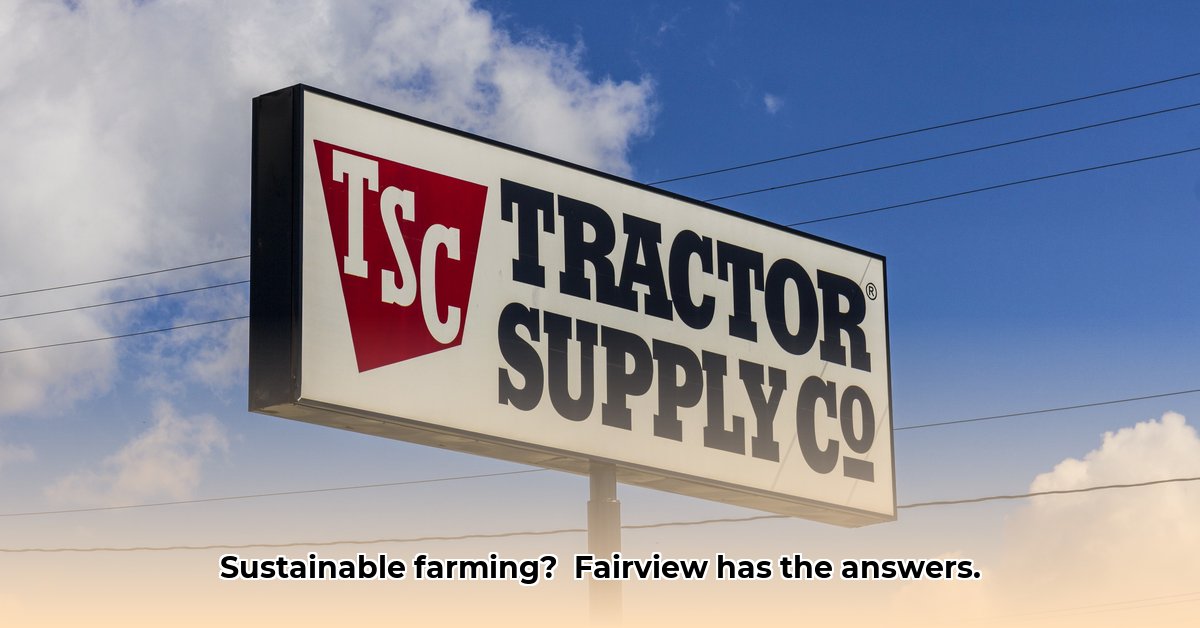
Fairview Tractor Supply plays a significant role in the agricultural landscape of Tennessee, providing farmers with essential tools and resources. However, the extent to which their operations genuinely support sustainable farming practices warrants closer examination. This article assesses Fairview Tractor Supply's contribution to sustainable agriculture, analyzing their offerings, highlighting areas for improvement, and offering actionable recommendations for all stakeholders. The goal? To foster a more sustainable and resilient food system. For land clearing needs, consider efficient equipment like this.
Fairview Tractor Supply's Offerings and Their Impact on Sustainability
Fairview Tractor Supply offers a range of products relevant to sustainable agriculture, including organic animal feed, supposedly eco-friendly pesticides and herbicides, and water-saving irrigation equipment. These products could contribute to more environmentally sound farming practices. However, a significant shortcoming is the lack of transparent and readily available information regarding the full environmental impact of these products across their entire lifecycle – from production to disposal. How can farmers confidently choose sustainable options without complete information on sourcing, manufacturing processes, and end-of-life management? This lack of transparency significantly hinders the accurate assessment of their contribution to sustainable farming.
For example, while some fertilizers offered might increase crop yields, their potential negative environmental impacts (e.g., water pollution from runoff) are not always clearly communicated. This lack of readily available data about product sustainability raises questions about the company's overall commitment to environmentally conscious farming.
Examining the Sustainability of Fairview Tractor Supply's Practices
A critical examination reveals that Fairview Tractor Supply’s commitment to sustainable agriculture is still evolving. While the potential for positive environmental impact exists through their product offerings, the lack of comprehensive data and readily available information on their environmental footprint represents a major obstacle. Furthermore, the absence of robust farmer education programs regarding the responsible application of these products diminishes their effectiveness.
“The challenge isn't just about offering sustainable products; it's about fostering a comprehensive understanding of their proper usage and the long-term environmental consequences,” says Dr. Emily Carter, Professor of Environmental Science at the University of Tennessee. “Without thorough education and readily available data, the environmental benefits remain unrealized.”
This lack of transparent information on the sustainability of their full product line directly impacts consumers’ ability to make informed purchasing decisions.
Stakeholder Perspectives: A Collaborative Approach
Sustainable agriculture requires collaboration among diverse stakeholders. Farmers need access to genuinely sustainable products and the expertise to use them effectively. Consumers need clear, accurate information to make informed purchasing decisions that align with their values. Fairview Tractor Supply needs to address the transparency gap by providing comprehensive information about their products’ environmental impact. Finally, government agencies can play a critical role through incentives and regulations that promote sustainable practices.
Actionable Recommendations for a Greener Future
Concrete steps are needed to move towards a more sustainable agricultural system.
For Fairview Tractor Supply:
- Conduct a comprehensive sustainability audit: Within 1 year, assess the environmental impact of every product, publishing the findings transparently.
- Implement a transparency initiative: Within 1 year, clearly label products with sourcing details, environmental certifications, and lifecycle assessment information.
- Develop a comprehensive sustainability plan (3-5 years): Focus on eco-friendly sourcing, reduced packaging waste, lower carbon emissions, and continuous improvement.
- Invest in farmer education programs (3-5 years): Offer workshops and resources on sustainable farming practices and the responsible use of eco-friendly products.
For Farmers:
- Adopt responsible farming practices: Explore certifications like organic or sustainable agriculture practices.
- Advocate for policies supporting sustainable farming: Share your experiences and advocate for changes at the policy level.
For Consumers:
- Support businesses prioritizing sustainability: Choose products with clear and verifiable eco-labels.
- Demand greater transparency: Insist on complete information regarding the environmental impact of products across the supply chain.
For Government Agencies:
- Offer financial incentives: Provide grants and subsidies for adopting sustainable farming practices and equipment.
- Fund research and development: Invest in technologies promoting sustainable agriculture.
- Implement stricter regulations: Establish binding standards for environmental impact in agriculture.
Conclusion: Collaboration for a Sustainable Future
Sustainable agriculture is not merely a desirable goal; it is a critical necessity. Fairview Tractor Supply, along with all stakeholders, must act decisively to address the challenges and opportunities presented. Open communication, transparency, and a collaborative spirit are essential for building a truly sustainable and resilient agricultural system. The future of our food system depends on it. The question isn't just if we can achieve sustainable agriculture, but how quickly we act to make it a reality.